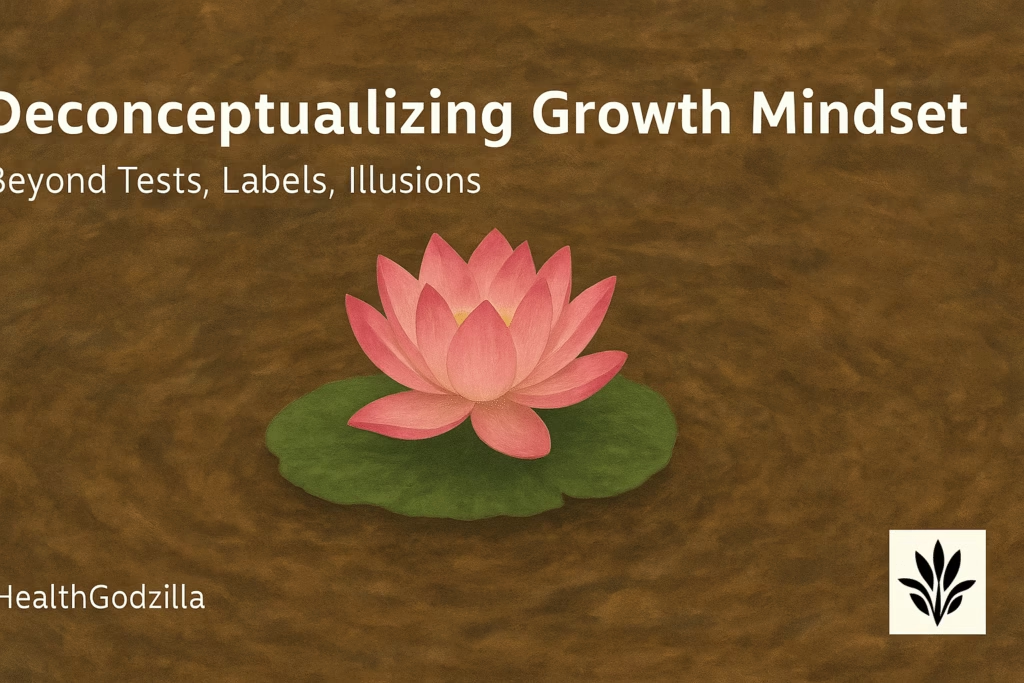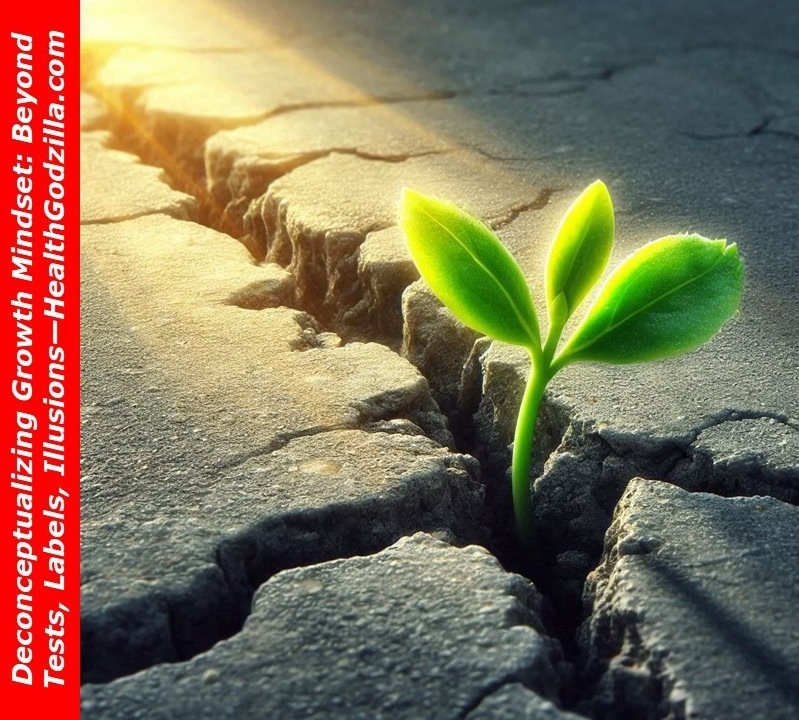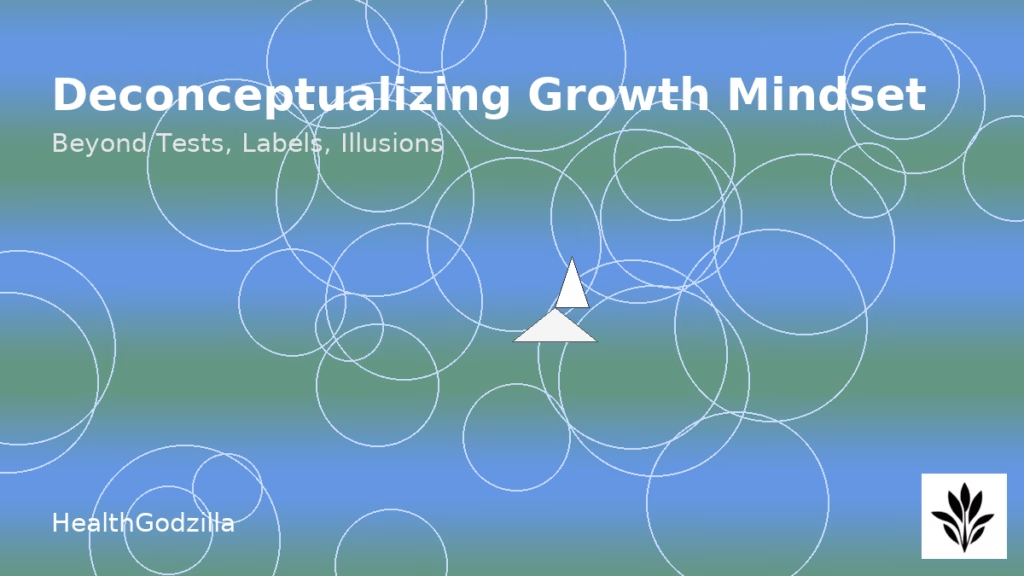
Opening Drift: The First Crack
We stand, barefoot, at the edge of a classroom river, where the first lesson in deconceptualizing growth mindset is felt, not taught. A boy is led away by a smiling teacher; a girl stumbles into a new country with a paper test waiting. Both are weighed before they have even learned how to stumble with grace. Meanwhile, a number is inked, a label whispered, and the current hardens into a wall.
The adults beam, frown, or nod with concern. The child listens. In that silence, the word potential becomes a cage. Yet, months later, the boy returns with grades reshaped by time; and years later, the girl gathers awards but still feels like an outsider. Their rivers kept moving while, nevertheless, the concept stayed nailed to the shore.
So, what if the label was never the truth, but only the shadow of a passing measurement? What if the very phrase we trust—mindset—has become another rigid stone in the stream? We celebrate one word as liberation, but then bind ourselves to it until it begins to choke.
This is the first crack. A reminder that concepts are not rivers. They are dams. Eventually, the water finds its way around.
The test paper is folded into ash instead of a paper boat. Its numbers dissolve into smoke. For a moment, nothing is left but air, refusing to carry a verdict.
Psychology — The Seduction of the Box
They brought a box to the classroom and called it proof.
Not a wooden crate or a chest, but the quiet cardboard of test paper, folded into a neat promise: measure here, decide there.
The children circled the box like it might open with a secret.
The experimenters smiled, the teachers scribbled, the parents waited for a verdict in ink.
In these early trials, the seeds of deconceptualizing growth mindset already stir—asking whether proof is truly proof, or just paper.
A question was read; pencils scratched; a score arrived.
Someone put that score on a small pedestal and called it fate.
The psychologists who designed the study did not pretend cruelty. They wanted to see how a label lands. So they handed children a sealed box and told them it held a test of an important school skill. Then they asked: how much does this measure you—is it a window or a wall?
That question itself opens the work of deconceptualizing growth mindset—challenging whether a sealed score can ever define an open life.
The answers split like light through panes.
Some children shrugged and said, “It is a test.”
They treated it as one moment among moments.
Others looked at the box and saw a prophecy.
To them the paper had a voice: this is who you are.
That voice tightened around them, shaping how they tried next time.
This is the seduction.
Measurement promises certainty.
A number whispers that a thing is known.
We hunger for that feeling—we want edges in a messy world.
So we lay out charts, assign ranks, hang letters by the door.
But the temptation is to stop there: to take a single point and draw a line across a life.
A teacher once answered a questionnaire with a single rebuke that should be framed and hung.
He refused the box.
He wrote that it is impossible to infer the slope of a child’s line from one lonely dot.
“There is no line, only a point.”
His pen was a small act of deconceptualization: he refused to let a number stand in for a becoming.
Carol Dweck mapped two languages people use—one that treats ability as fixed, one that treats it as malleable.
She offered a lens, a useful tool.
Yet tools turn into toolshed walls when we forget their origins.
We took a liberation and made it law.
Teachers began to name students, schools stamped checklists, and the language that once loosened became another set of labels.
The very word that promised movement can become a brace against motion.
Notice this double-bind: psychology gives us instruments to understand learning; our hunger for simple answers turns instruments into idols.
We crave diagnoses, quick fixes, a checklist we can file under “done.”
Thus compassion becomes checkboxing; curiosity becomes scoring.
And the child learns to gaze not at the river but at the scoreboard.
Perseverance enters the scene as a hero in a familiar fable.
Angela Duckworth’s work—about grit and long, steady practice—arrives like a weather report: storms will come; prepare.
Important. Useful.
However, beware the myth that grit alone is a cure.
Tenacity without shelter, without fair winds, becomes stubbornness against a locked door.
To valorize perseverance is fine; to romanticize it as a solo magic is dangerous.
We still need better designs—classrooms that let trial feel safe, policies that fix bad ladders, families that give children permission to fail and try.
In this, the true practice of deconceptualizing growth mindset is revealed: moving beyond myth to structures that breathe with learners.
So what does deconceptualizing look like inside psychology?
This is not tearing down the experiments—those are precious.
Rather, it’s the gentle work of moving the object off the altar.
Tests tell us something; they do not tell us everything.
In the end, the task is trading an oracle for a conversation.
Small moves, practical and brave:
- Replace the one decisive exam with a ledge of many small trials—low stakes, curious prompts, return invitations. Let the child respond today and respond again next week. Let the teacher watch the arc, not just the dot.
- Change the language in reports: from “ability” to “workings”; from “gifted” to “trying”; from “fail” to “rehearse.” Words nudge reality; choose verbs that allow motion.
- Keep a teacher’s notebook of attempts: a record of experiments, not absolutes. One line—“Tried strategy X; responded with curiosity”—does more for a future than a black mark.
We must also guard against another sin: the co-opting of liberation language by systems that love metrics.
When a policy menu says “implement scaffolding” and then measures only test scores, the scaffold becomes a statue.
So deconceptualization requires courage in auditors’ rooms and principals’ meetings—small rebellions like asking, “What would this child need tomorrow?” instead of “Where do we put them on the list?”
At the end of this section, carry this question lightly: what if the science of learning guarded humility as its first rule?
What if every study concluded with: We measured this. We saw that. We are still learning.
Then the box becomes a box you can open—not the box that opens you.
Thread to Culture:
If psychology hands us a box, culture paints it with meaning.
Across villages and cities, families graft stories onto these measurements.
Next: we peel that paint and listen.
A parent crosses out the word “gifted” in red ink and writes “trying.” The child does not yet see the difference, but later remembers that one revision as the truest prophecy.

Culture — Inherited Maps, Inherited Traps
Psychology offers the box; culture decides what to write on its lid.
One village calls it talent, another calls it effort, a third whispers destiny.
Here the work of deconceptualizing growth mindset begins—not by denying culture, but by noticing how each story reshapes the air around a child.
In East Asia, the tale often runs like this: if you study hard, practice daily, and endure storms without complaint, you will find your way.
Effort is a virtue in Confucian memory, tied to respect, perseverance, moral fiber.
Report cards are less prophecy than logbooks of practice.
The label is not what you are but how much you have worked.
To be called diligent is to be seen as honorable.
Across the Pacific, in much of the West, another myth runs louder: you either have “it” or you don’t.
The natural athlete, the gifted child, the prodigy at the piano.
Talent is the key, effort the supporting role.
This story is intoxicating—it flatters those labeled early and burns those who are late to bloom.
A rejection letter reads as a verdict.
A failed audition feels like exile.
Neither tale is cruel by intent; both are maps offered to guide children through the fog.
But a map, once inherited, also limits.
Confucian diligence can suffocate the child who wants to play, not practice.
Western talent-worship can chain the child who wants to improve slowly, unseen.
Both stories oversimplify rivers into grids.
Both create traps where walls were never meant.
Heine and colleagues once asked: is self-regard universal?
Their research showed cracks in the Western assumption that every person needs constant praise to thrive.
In Japan or China, criticism can be seen not as humiliation but as nourishment—an energy to improve.
Praise there is thinner; effort thicker.
Yet this is not the whole truth either.
There are children crushed by relentless demand, just as there are Western children frozen by the fear of not being “special enough.”
What matters is the cultural paint we inherit.
Each society chooses a few bright colors and forgets the rest of the palette.
We pretend those colors are permanent.
But peel away the layers, and you will find the same restless verb underneath: trying, stumbling, persisting, becoming.
This peeling-back is the essence of deconceptualizing growth mindset: not discarding culture, but refusing to mistake its maps for the terrain.
To deconceptualize here means not to throw away culture, but to see through it.
To say: these maps were useful once, but they are not the terrain.
The river does not care about our grids.
So ask, gently: whose story are we repeating when we talk about potential?
Whose myth are we handing our children?
The answer may tell us less about them and more about the furniture of our own minds.
Thread to Resilience:
When maps mislead, storms arrive.
And it is in storms—not maps—that we see who keeps walking.
A chalkboard is erased. Dust rises, white in the afternoon light. The word “ability” lingers only as drifting powder, already vanishing into air.
Resilience — Failure Misnamed
We tell stories about failure as if it were a locked gate before the shining palace of success.
A hero stumbles, suffers, and then—cue music—rises in glory.
We polish these stories into posters, forgetting the dust in the lungs, the ache in the joints, the years of slothly fingers on instruments that seemed unwilling to sing.
But failure is not a gate.
It is part of the path itself.
Walking means stumbling.
Practice becomes the art of repeating mistakes with a slightly different angle each time.
Living, meanwhile, is to blunt one’s skill and sharpen it again—like you did with your music today—discovering that practice is not a return to zero but a reawakening of muscles that remember more than they admit.
Consider Einstein.
As a boy, teachers whispered that he was slow, unremarkable, mentally dull.
They misnamed silence as stupidity, hesitation as incapacity.
Or Rowling, rejected a dozen times before a publisher saw possibility in her manuscript.
Or Michael Jordan, cut from a high school team.
We retell these tales as if their rejections were dramatic preludes to certain triumph.
But in the moment they were just bruises, confusions, nights of doubt.
Resilience was not a promise of success—it was the practice of continuing.
This is also where deconceptualizing growth mindset matters: seeing failure not as destiny but as rehearsal in disguise.
Angela Duckworth called it grit: perseverance and passion sustained across years.
Useful, yes.
But even grit can be misnamed if we romanticize it.
To persevere blindly without nourishment, without fair structures, can break a person rather than raise them.
True resilience is less about heroics and more about ecology: the support of teachers who encourage another attempt, the parent who whispers, “Try again tomorrow,” the self that returns to the harmonium even when the throat falters.
Failure is not prophecy.
It is rehearsal.
It does not announce what cannot be done—it merely records what has not yet been managed.
And rehearsal itself is not glamorous.
At first, it is slow.
Later, it returns blunt.
The harmonium resists under the fingers, the throat offers only a crack instead of a note.
Yet within that bluntness lies the possibility of tomorrow’s sharper edge.
Deconceptualizing resilience means loosening it from the triumphal posters.
Not every stumble leads to stardom.
Many stumbles simply lead to another stumble, then another, and slowly, a craft takes shape.
The sculptor’s stone chips away.
The voice stretches across scales again.
The athlete learns to love the daily grind more than the trophy.
In that daily grind lies the living truth of deconceptualizing growth mindset—not chasing the myth of victory, but finding motion in repetition.
When we misname failure as defeat, we deny the river its bends.
When we misname it as a heroic prelude to certain victory, we turn it into myth.
Both are illusions.
Failure is neither tombstone nor trumpet—it is current.
And current, by nature, carries you somewhere, if you keep stepping.
Thread to Philosophy:
If resilience is not a badge or a myth, then what is it?
Perhaps philosophy can whisper: you were never the same person twice, so why treat failure as final?
A violin string snaps in the middle of a performance. The bow continues, awkward but alive. The music bends, becomes something else. Failure misnamed.

Philosophy — Fragments, Not Formulas
Philosophy does not hand us solutions; it hands us cracks in the wall.
It is a lantern that shows more shadows than light.
And perhaps that is what we need when resilience risks becoming another poster on the schoolroom wall.
Heraclitus stood by a river and said no one steps in the same one twice.
The words survived, but even they are slippery—did he mean the river changes, or the man, or both?
The fragment resists. That is the point.
You cannot use it as a formula, only as a reminder: you are motion.
To call failure final is to imagine you were ever the same person twice.
Once, you were not. Now, you are not. And tomorrow, you will not be.
Here, deconceptualizing growth mindset becomes a reminder: life is flux, not a fixed script.
Centuries later, Emerson sat with his pen in Concord and wrote Self-Reliance.
His words cut differently: “The only person you are destined to become is the person you decide to be.”
Again, not formula but fracture.
He pushes destiny off the pedestal and hands you verbs instead.
Deciding. Becoming. Choosing.
Each moment is a sentence half-written.
This too is deconceptualizing growth mindset—shifting from destiny as noun to becoming as verb.
Philosophy deconceptualizes by refusing to comfort.
Where psychology builds boxes and culture paints them, philosophy knocks a hole in the side.
It whispers that the box was never real.
That potential is not a noun you can weigh but a verb you can live.
Dostoevsky, through Alyosha in The Brothers Karamazov, offers another fragment: transformation through love, faith, perseverance.
Shakespeare scatters fragments across tragedies and comedies alike—characters grappling with fate only to learn that action, not prophecy, shapes them.
These too are not formulas.
They are echoes, telling us that every so-called destiny is only a draft.
If you look for certainty here, you will be disappointed.
But if you are willing to live with fragments, you will notice something else: the fragments give you room to breathe.
They leave gaps for your own footsteps.
To deconceptualize resilience through philosophy is to abandon the idea of a path that ends in clarity.
It is to accept that failure, effort, and change are not steps toward a grand finale but the fabric of existence itself.
Fragments remind us that our concepts—mindset, intelligence, success—are scaffolds we keep erecting and dismantling, not eternal truths.
This is why deconceptualizing growth mindset is not about tearing down thought, but letting fragments remain fragments—open, porous, alive.
Therefore, let the fragments stand.
And let the river run.
Do not force them into a neat pattern.
They are not formulas.
They are cracks that let the water seep through.
Thread to The River:
If philosophy gives us cracks and fragments, how then do we live and teach?
Perhaps by treating practice itself as the river—never finished, never fixed, only flowing.
A child kneels by the riverbank, cups water in her palms, and laughs as it slips through. The river is never hers to hold—it is only hers to touch, for a moment.
The River — Practices Without Pedestals
What, then, do we do—if concepts are dams and labels are cages?
We do not throw away our tools or pretend words mean nothing.
Instead, we practice in small, brave experiments; each strategy is a trial, never a command.
Practice One: Replace verdicts with rehearsals.
Instead of the single decisive exam, imagine a string of low-stakes trials—weekly sketches instead of a final portrait.
Each attempt becomes a ripple, not a prophecy.
The child learns that learning is not about surviving judgment day but about living inside the rehearsal hall.
Practice Two: Shift the grammar.
Reports and feedback often freeze into nouns: ability, failure, giftedness.
Replace them with verbs.
Write “she is learning,” “he is rehearsing,” “they are trying.”
Verbs admit motion.
Nouns pretend to end the story.
Practice Three: Keep a book of attempts.
Not a gradebook, but a log of trials.
One line might read: “Asked her to solve with a new method; she tried, got lost, asked for help.”
That log respects the curve, not just the point.
It records the river as it bends.
Practice Four: Teach repair as craft.
Let classrooms display not only prize-winning projects but also repairs—essays revised, equations solved differently, drawings redone.
Let children see that repair is not shameful but skillful.
Resilience lives not in the headline but in the margin notes.
Practice Five: Guard against the idol of grit.
Celebrate perseverance, but refuse to fetishize suffering.
Create structures that feed perseverance: supportive peers, fair policies, caring mentors.
The river needs banks to guide it; without them, it floods.
Resilience is communal, not solitary.
These practices are not commandments.
They are rafts.
Each can be tried, adjusted, or abandoned.
None promises certainty, only possibility.
Because the river has no pedestal.
This river is not climbed to plant a flag.
Step into it—wade, stumble, float, learn how currents change.
Call it mindset, intelligence, or potential—but the river does not care what name you give.
It will still flow.
To deconceptualize is not to throw away learning.
It is to refuse the comfort of walls.
It is to let education breathe as a river—where the task is not to win or to prove, but to practice, again and again, until the water itself becomes your teacher.
Closing Thread — No Final Word
Perhaps the real lesson is silence. To watch the water and not insist on naming it. To fold a child’s test paper into a boat, set it drifting, and let tomorrow decide its course.
We do not finish rivers. We keep stepping, listening to the water’s small replies.
🍂 Hello, Artista

The river grows quiet.
Two friends arrive, carrying their usual mismatched bundles—one with notebooks heavy as stone, the other with sketches as light as wind.
Organum: You’ve read the essay, haven’t you?
I fear I’ve only carried fragments, never a finished map.
Artista: (smiling) But fragments breathe.
A whole map is only a cage.
Better the cracks, better the water slipping through.
Organum: Still, I wonder.
If mindset is not a ladder, not a box, not a crown—what do we hold onto?
Artista: Not onto. Into.
We step into rivers.
Footing is tested with care.
Sometimes we stumble, sometimes float, always trying again. My rabbits, Whitee and Brownie, have taught me more than the posters ever did—falling from ledges, climbing again, never naming it “failure.”
Organum: And my dogs—RD, MD, Barku, Gulli—they turn rehearsal into joy.
They don’t call it grit when they fetch and miss.
They just fetch again.
Artista: Perhaps that’s the secret.
Children, animals, rivers—they do not care about our labels.
They live verbs, not nouns.
Organum: (softly) And maybe that is enough.
Not a doctrine, not a verdict—just practice, stitched into days.
The two fall silent.
Somewhere, chalk dust hangs in a classroom window.
Somewhere, a violin string snaps, and still the bow moves.
The river carries on, uncaring of names, but carrying, always, those who dare to step inside.
✍️ Author’s Reflection
I was not alone when I wrote this. Others spoke, and I listened.
My grandmother once called me গোবরে পদ্মফুল—“a lotus on cowdung.” In Bangla, this idiom means someone who does something extraordinary in an adverse place. To my young ears it felt sharp, almost cruel, but it carried a truth: beauty can rise where no one expects it. Years later, however, when I return to the harmonium—fingers stiff, throat faltering—I understand her words differently. Skills blunt, yet they sharpen again with practice. Flowers rise from unlikely soil. And here, indeed, the act of deconceptualizing growth mindset feels the same—finding motion, even in soil thought barren.
This essay is not about growth as a ladder. Rather, it is about growth as illusion, as fragment, as river. A test burns to ash. A chalkboard erases itself. A violin string snaps mid-song. Still, music is made.
If I have written in fragments, it is because life itself speaks in fragments. Therefore, if this reads like poetry, it is because prose could not hold the river.
I offer no final word. Instead, only this: we do not finish rivers. We keep stepping, sometimes sinking, sometimes floating. Even so, in filth the night queen can still blossom, and its fragrance does not ask permission.
—Jamee
🌼 Articles You May Like
From metal minds to stardust thoughts—more journeys await:
- Groupthink and Leadership: Born or Made in the Mindset Mirror. Groupthink and leadership—twin forces shaped by mindset. Explore how silence, dissent, and growth define whether leaders are born or made.
- Waterborne Diseases: When Rivers Whisper of Illness and Hope. Waterborne diseases whisper through rivers both as menace and as plea—explore how clean water can heal communities, narrated by Zarvan.
Curated with stardust by Organum & Artista under a sky full of questions.
📚 Principal Sources
- Dweck, C. S. (2006). Mindset: The new psychology of success. Random House.
- Heine, S. J., Lehman, D. R., Markus, H. R., & Kitayama, S. (1999). Is there a universal need for positive self-regard? Psychological Review, 106(4), 766–794.
- Duckworth, A. L., Peterson, C., Matthews, M. D., & Kelly, D. R. (2007). Grit: Perseverance and passion for long-term goals. Journal of Personality and Social Psychology, 92(6), 1087–1101.
- Emerson, R. W. (1841). Self-Reliance. In Essays: First Series. James Munroe and Company. Retrieved from https://openlibrary.org/books/OL23752038M/Essays
- Heraclitus. (Fragments, c. 500 BCE). In Freeman, K. (1948). Ancilla to the pre-Socratic philosophers. Harvard University Press.
Relevant chapters and sections were interpreted through a narrative lens rather than cited academically.
Note: The idiom “গোবরে পদ্মফুল” (lotus on cowdung) from Bangla culture is referenced in the Author’s Reflection. It signifies extraordinary achievement in adverse circumstances and was preserved here as part of the cultural context.
This article is also archived for open access on https://zenodo.org/records/17162462. Archiving ensures its permanence in the scholarly record.
Leave a Reply